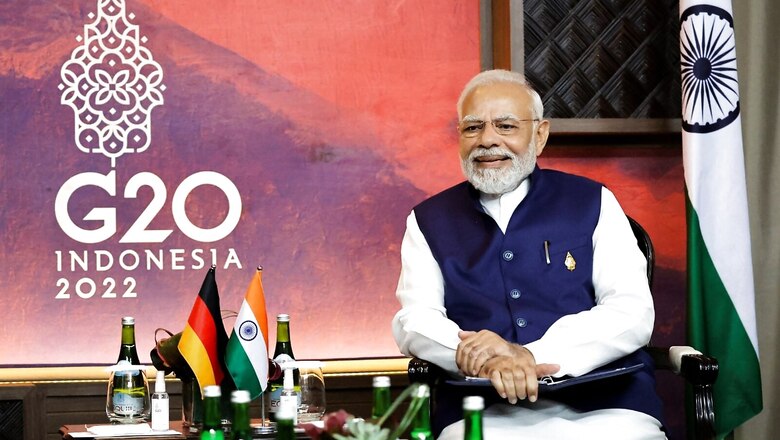
views
India taking the leadership of the Global South has several diplomatic dimensions. It broadens India’s role in addressing the many challenges currently facing the international community.
No doubt the countries of the Global South raise their voice in the UN General Assembly and in the various international conferences organised under UN auspices. The Global South features many regional organisations, be it the African Union, ASEAN, Mercosur, the Caribbean Community, etc, where regional issues and concerns and their linkages with larger global developments are addressed. It is, therefore, not as if the voice of the Global South is not heard.
It is in the specific context of G20 that India has taken the lead to reflect the broad concerns of the developing countries in the discussions on economic and financial issues, as well as larger developmental ones, in this more restricted and focused group of the world’s leading 20 economies, created in the first place to address more purposefully pressing emerging issues of global economic growth and financial stability.
India has more credibility today for many reasons to amplify the voice of the Global South. India’s position today has no relevance to the Cold War years when it sought to distance itself from its ideological antagonisms and pressures to choose one or the other side. India’s biggest economic partner today is the US; at the same time India is nurturing its vital historic ties with Russia. Even with regard to China, its biggest strategic adversary, India has a major economic relationship. If India is a member of the Quad and also the I2U2 (grouping India, Israel, US and UAE), and is pledged to the Indo-Pacific concept, it is also a member of BRICS and the SCO. India now has a bridge position between developed and developing countries and between adversaries in a very different context today.
In a sense, India taking the leadership to voice the concerns of the Global South also promotes a multipolar or a poly-centric world. India, seen as a country with a capacity to influence and mobilise the Global South, gives it more political and diplomatic strength in dealing with all its partners such as the US and its adversaries such as China.
India is now the fifth largest global economy and could well be the third largest by 2030. With the global economy under stress and signs of recession in some developed economies, India’s growth at around 7 percent this year will be the highest amongst the large economies as per the IMF and the World Bank. India’s voice is now backed by economic strength of its own. Its achievements in making advances in digitalisation and linking it to the country’s development needs, be it in the areas of direct benefit schemes, payment systems, creation of a unique identification system (Aadhaar), etc, can be emulated advantageously by other developing countries.
India has handled the Covid-19 crisis better than many advanced countries, relying on its own capacities to vaccinate its huge population and also supply much needed vaccines to a large number of developing countries at a time when the developed economies were hoarding them for domestic requirements. India has also provided humanitarian aid in the form of food and medicines to a handful of developing countries in distress.
India has also engaged as never before groups of island states, whether in the Caribbean or the Pacific, as part of its diplomatic focus on the Global South. This also includes continuing attention to Africa. Nearer home, India has revitalised ties with its neighbours and devoted special attention to the Indian Ocean rim states.
India thus bridges the East-West as well as the North-South divides. It is this position that it intends to capitalise on during its G20 presidency. The G7 has now a tradition of inviting select countries to its summits to gain more legitimacy to the decisions that emerge. The BRICS, SCO and G20 summits too are occasions when the presiding country invites a set of countries to attend as part of its larger diplomatic objectives. India has been imaginative in not only inviting select countries to the G20 summit but reaching out to countries of the Global South as a whole to elicit from them their views and priorities about issues that need to be addressed in the G20 summit deliberations.
That after Indonesia, India is presiding over the G20 and will be followed by Brazil and South Africa shows the increasing role of the Global South in shaping global decisions on economic growth and financial stability and other issues that now figure on the G20 agenda, be it debt relief, climate finance, energy transition, achievement of SDG goals, data location and privacy, food and energy security, etc.
It is in this background that India organised a virtual Voice of South Summit 2023 on 12-13 January, that included a Foreign Ministers Session and a Leaders Session. At least 120 countries participated. The statements made by India’s Prime Minister and its External Affairs Minister on the occasion spell out India’s thinking and objectives in organising this summit and feeding its outcome into G20 deliberations, apart from developing an independent India-Global South agenda through this summit.
External Affairs Minister S Jaishankar stated at the opening of the Foreign Ministers Session that the key concerns of the developing world are not being captured in the G20 debates and discussions, be it the impact of the Covid-19 pandemic, climate change, terrorism, ongoing conflicts and debt crises. India has therefore wanted to ensure that India’s G20 presidency gathers that voice, the perspectives, the priorities of the Global South, and articulates them clearly in its debates.
Jaishankar expressed India’s view that the world is becoming increasingly volatile and uncertain for the South, that the Covid-19 period showed to it the danger of over-centralised globalisation and fragile supply chains, with the Ukraine conflict adding more stress, especially on food, energy and fertiliser security. He noted that capital flows started constricting even as debts mounted, with developing countries also expected to bear the burden of developing climate resilience, industrialise without carbonising, deal with increasing climate events and lift millions out of poverty while managing at the same time disruptions and uncertainties in global supply chains.
India believes in a ‘Global South sensitive’ model of globalisation based on three fundamental shifts: from self-centered globalisation to human-centric globalisation, a different approach to Innovation & Technology by deploying Global South-led innovations for societal transformation, and in the field of development cooperation shifting from debt creating projects to a demand-driven and sustainable development cooperation. Reading between the lines these are strictures both on West and China on their handling of the development issues involving the Global South.
Jaishankar offered India’s readiness to share its experiences and expertise in deploying game changing digital public goods in universal identification, financial payments, direct benefit transfer, digital health, commerce, industry and logistics, which will be both affordable and accessible to the Global South, simple, scalable and sustainable. He noted the emergence of India as an education and healthcare hub for the Global South.
Jaishankar added that India will shape its G20 priorities not only in consultation with its G20 partners, but also the Global South, making Reformed Multilateralism and Institutions for the 21st century a priority during its Presidency and accelerating progress on the SDGs. India will take a LiFE approach to climate action and seek stronger international cooperation against the increasing threat of terrorism faced by many countries with the use of emerging technologies. India will drive a consensus on a Green Development Pact of the G20 Leaders. It would take up discussions on data for development. On the peace and security front, India believes that the path of diplomacy, dialogue and cooperation should take primacy over competition, conflict, and divisions.
In his remarks at the opening and concluding sessions of the summit, Prime Minister Modi noted that developing countries desire a globalisation that does not create a Climate Crisis or a Debt Crisis, or lead to an unequal distribution of vaccines or over-concentrated global supply chains. He noted that that geopolitical fragmentation and tensions are distracting the South from focusing on its development priorities and causing sharp swings in international prices of food, fuel, fertilisers and other commodities.
Modi announced several Indian initiatives directed at fostering India-Global South cooperation: A “Global-South Center of Excellence” that will undertake research on development solutions or best-practices in any developing countries that can be scaled up and implemented in other countries of the Global South, giving as an example the digital public goods developed by India in fields like electronic-payments, health, education, or e-governance; the launching of a ‘Global-South Science & Technology initiative’ to share India’s expertise in nuclear and space technology ; with India’s ‘Vaccine Maitri’ initiative in mind, a new ‘Aarogya Maitri’ project under which India will provide essential medical supplies to any developing country affected by natural disasters or a humanitarian crisis; a ‘Global-South Young Diplomats Forum’ for synergising the diplomatic voice of the developing countries, and instituting ‘Global-South Scholarships’ for students from developing countries to pursue higher education in India.
Modi noted that the discussions during the summit showed an agreement on the importance of South-South Cooperation, an emphasis on promoting traditional medicine, developing regional hubs for healthcare, improving mobility of health professionals, sharing of best practices in vocational training, using technology to provide distance education, especially in remote areas, deploying digital public goods to increase financial inclusion in developing countries at great scale and speed, investing in connectivity infrastructure, pressing the developed world to fulfil its obligations on Climate Finance and Technology and moving away from ‘use and throw’ consumption towards more environment friendly sustainable lifestyles.
Taking the leadership of the Global South shows that India intends to ambitiously enhance its role in international governance and in the search for solutions to many pressing issues facing the international community. It will be a long haul, going beyond the G 20 presidency, as all the issues India is raising are already on the global agenda and finding solutions in an environment of sharpened East-West divide and the North becoming more inward as its economies come under pressure will be that much more difficult.
Kanwal Sibal is a former Indian Foreign Secretary. He was India’s Ambassador to Turkey, Egypt, France and Russia. The views expressed in this article are those of the author and do not represent the stand of this publication.
Read all the Latest Opinions here


















Comments
0 comment